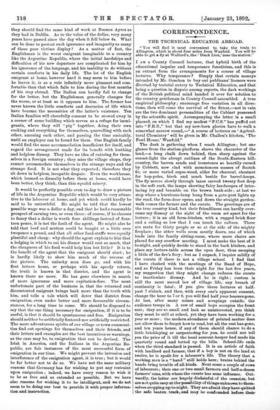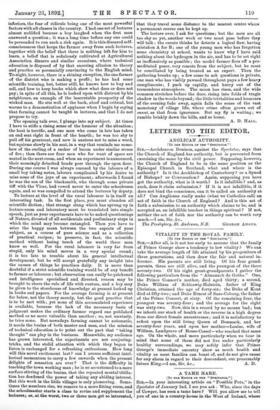CORRESPONDENCE.
THE TECHNICAL EDUCATOR ABROAD.
"You will find it most convenient to take the train to Allington, which is about four miles from Wanfold. You will be able to get a fly at Walford's, the Black Lion,' near the station."
I AM a County Council lecturer, that hybrid birth of the educational impulse and temperance fanaticism, and this is an extract from the arrangements for a course of village lectures. Why temperance P Simply that certain moneys. intended by Mr. Goschen to buy out publicans' licences were diverted by teetotal outcry to Technical Educaticn, and that being a question in dispute among experts, the dark workings. of the British political mind handed it over for solution to the country gentleman in County Council assembled. A true empirical philosophy ; encourage free variation in all direc- tions, then will come the survival of the fittest,—not in vain are the two dominant personalities of the Cabinet possessed by the scientific spirit. Accompanying the letter is a small placard, on which I find my modest " F.C.S." has puffed out into " F.R.S.," but that my new-born glories have to walk a somewhat narrow round,—" A course of lectures on ' Agricul- tural Chemistry' will be given in Mr. Challen's kitchen, The Fowl House,' Wanfold."
The dusk• is gathering when I reach Allington ; but one- glance from the station-platform shows the character of the land,—a long chalk down behind, then sharp against the sunset-light the abrupt outlines of the South-Eastern hill- country, the barren sands and ironstones so heartily cursed by Cobbett, now clad with monotonous masses of Scotch fir, or more varied copse-wood, alder for charcoal, chestnut for hop-poles, birch and much beside for barrel-hoops. The fly moves slowly through lanes carved twenty feet deep. in the soft rock, the lamps showing fairy landscapes of inter- lacing ivy and bramble on the brown bank-side ; at last we stop where a hurricane-lamp hung from a gate-post lights up the road, the farm-door opens, and down the straight garden- walk comes the farmer and the curate. The greetings are of the true country kind, but their friendliness can hardly over- come my dismay at the sight of the room set apart for the lecture ; it is an old farm-kitchen, with a rugged brick floor- and a ceiling so low that I can touch the rafters. There are seats for thirty people or so at the side of the mighty fireplace ; the other walls seem mostly doors, one of which leads into the family sitting-room, where more chairs &re- placed for any overflow meeting. I must make the best of it to-night, and quickly decide to stand in the back kitchen, and place my lecture-table across the open door, thus escaping a little of the fire's fury; but as I unpack, I inquire mildly of the curate if there is not a village school. I find that I have clashed with the meetings of the Band of Hope,. and as Friday has been their night for the last five years,. my suggestion that they might change reduces the curate
to inarticulate dismay. And he is right ; custom is. still the most sacred law of village life, any breach of continuity is fatal ; if you give three lectures at half- past 7 o'clock, and then, with every one's apparent consent, change the hour to 7 or 8, you will find half your hearers gone. At last, after many noises and scrapings outside, the audience troops in. A row of small boys occupies the front seat; they are so small and look so uninterested, you think they must be still at school, yet they have been working for a. year or more ; the modern abundance of printed matter does not allow them to forget how to read, bat all the rest has gone, and ten years hence, if any of them should chance to do a little bricklaying or carpentering for you, he could not tell you the price of it till the local account-keeper had made his quarterly round and totted up the bills. School-life ends when the third standard is passed. It is an article of faith with landlord and farmer, that if a boy is not on the land at twelve, he is spoilt for a labourer's life. The theory that a. working man is a " hand " still holds here ; brains behind the hands bring trouble of all kinds. Next come a couple of rows of labourers; then one or two small farmers and half-a-doeen farmers' sons, with whom the curate has some influence. Out- wardly, the latter are hugely disdainful of the occasion, but are not quite easy at the possibility of things unknown to them- selves cropping up to-night. They are afraid they have quitted the safe beaten track, and may be confounded before their
inferiors, the fear of ridicule being one of the most powerful factors with all classes in the country. I had one set of lectures almost nullified because a boy laughed when the first man answered a question ; it was a long time before any one could be persuaded to run such a risk again. It is this diseased self- -consciousness that keeps the farmer away from such lectures, together with the belief that there is nothing left for him to learn, a belief that is sedulously cultivated at Agricultural Association dinners and similar occasions, where technical education is disposed of by that sneering allusion to theory and practice so perennially convincing to the English mind. To-night, however, there is a shining exception, the one farmer of the district who is making a profit ; he has had some scientific training, but, better still, he knows how to buy and sell, and how to keep books which show what does or does not pay; in spite of all this, he is looked upon with distrust by his neighbours, an example of the inscrutable prosperity of the wicked man. He sits well at the back, aloof and critical, but warms to a demonstration of applause when I begin by saying that farming cannot be taught in lectures, and that I do not propose to try.
The opening talk over, I plunge into my subject. At times I have to stifle a rising sense of the humour of the situation ; the heat is terrific, and one man who came in late has taken an end seat right in front of the hearth ; he was too shy to pull off his greatcoat, and now is anxious not to miss a word, but squirms slowly in his seat, in a way that reminds me some- how of the curling of a rasher of bacon under similar stress of fire ; then there are four men who for want of space are seated in the next room, and when an experiment is announced, their seemingly detached heads peer through the open door. During one course I was always amused by the labours of a small boy taking notes, labours complicated by his desire to miss none of the joys of an experiment; afterwards I found he was the son of the blacksmith, who through some private tiff with the Vicar, had vowed never to enter the schoolroom again, and so was compelled to attend the lectures by deputy.
To lecture at the level of the rural labourer is in itself an interesting task. In the first place, you must abandon all scientific diction ; that strange slang which has sprung up in lecture-room and laboratory must be translated into simple speech, just as your experiments have to be naked questionings -of Nature, divested of all accidentals and preliminary steps in which the mind may become entangled. Then you have to seize the happy mean between the two aspects of your subject, as a course of pure science and as a collection of practical recipes ; to preserve, in fact, the scientific method without losing touch of the world these men know so well. For the rural labourer is very far from stupid, only his mind moves in a very special round ; it is too late to trouble about his general intellectual development, but he will accept gratefully any insight into the causes of things he practises daily. It is more than -doubtful if a strict scientific training would be of any benefit to farmer or labourer ; but observation can easily be quickened and intelligence specialised and directed, reason may be brought to share the rule of life with custom, and a key may be given to the storehouse of knowledge at present locked up in books and papers. For the average farming is at present far below, not the theory merely, but the good practice that is to be met with; yet none of this accumulated experience is available, because the lack of the necessary basis of judgment makes the ordinary farmer regard one published method as no more valuable than another ; so, not unwisely, he tries none. But nowadays farming cannot be automatic, it needs the brains of both master and man, and the mission of technical education is to point out the part that " taking thought" can play in the business. Meanwhile, my audience has grown interested, the experiments are not conjuring- tricks, and the stolid attention with which they began to listen is exchanged for a refreshing enthusiasm. How long will this novel excitement last P can I arouse sufficient intel- lectual momentum to carry a few onwards when the present delights of sensation are over ? That is the difficulty in teaching the town working man ; he is so accustomed to a mere surface stirring of the brains, that the repeated mental titilla- tion has deadened the power of taking any abiding interest. But this work in the little villages is only pioneering.. Some- times the numbers rise, we remove to a more fitting room, and the schoolmaster starts a class to revise and supplement the lectures; ar, at the worst, two- or three men get so interested,
that they travel some distance to the nearest centre where a permanent course can be kept up.
The lecture over, I ask for questions; but the men are all too shy as yet, another week or two must pass before they will talk : the curate thinks he detects a logical flaw, having mistaken A for B; one of the young men who has forgotten some chemistry at school, wants to know why I have said nothing about the hydrogen in the air, and has to be set right as inoffensively as possible; the model farmer fires off a pre- meditated poser, very remote from the subject, but he must be conciliated by being treated as an expert. Then the gathering breaks up ; a few come to ask questions in private, one man who has visibly yawned throughout pays a few heavy compliments ; I pack up rapidly, and hurry out of the tremendous atmosphere. The moon has risen, and the wide common stretches before the door, rising into folds of tragic shadow in the woods beyond ; the little trivialities and humours of the evening fade away, again falls the sense of the vast monotony of village life, where crime often grows out of ennui, as that from ignorance. But my fly is waiting ; we rumble briskly down the hills, and so home. A. D. HALL.



































 Previous page
Previous page